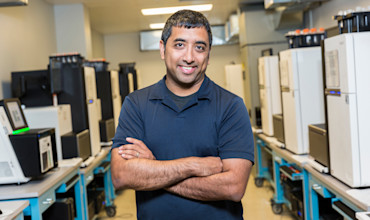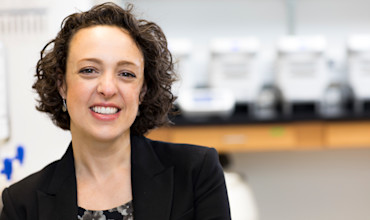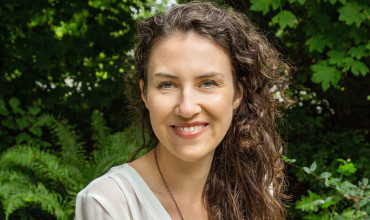About The Brotman Baty Institute
The Brotman Baty Institute for Precision Medicine, or BBI, was founded in November 2017 by UW Medicine, Fred Hutchinson Cancer Center and Seattle Children’s.
The Brotman Baty Institute for Precision Medicine, or BBI, was founded in November 2017 by UW Medicine, Fred Hutchinson Cancer Center and Seattle Children’s.
BBI takes advantage of Seattle’s culture of collaboration in technology and the health sciences, and its leadership in genomics, bioinformatics, and data science. Our scientists are contributing to basic biomedical research as well as patient outcomes through the development and application of precision approaches to healthcare.
Our major projects include:
Seattle Hub for Synthetic Biology: University of Washington & Allen Institute
Single Cell Sequencing: Single Cell Atlases & BBI Advanced Technology Lab
Variant Analysis: Center for the Multiplex Assessment of Phenotype, Center for Actionable Variant Analysis & Atlas of Variant Effects Alliance
Combining science, technology, and innovation, we support the work of our faculty, researchers, and investigators while also endeavoring to foster collaboration and innovation.
In all that we do and achieve, we have the Institute’s four visionary investors and founders to thank: Jeffrey H. and Susan Brotman, and Daniel R. and Pamela L. Baty.
Be a part of BBI’s mission by donating here: BBI Director's Fund
The Brotman Baty Institute for Precision Medicine, or BBI, was founded in November 2017 by UW Medicine, Fred Hutchinson Cancer Center and Seattle Children’s.

Jay Shendure is an Investigator of the Howard Hughes Medical Institute (HHMI), Professor of Genome Sciences at the University of Washington, Director of the Allen Discovery Center for Cell Lineage Tracing, and Scientific Director of the Brotman-Baty Institute for Precision Medicine.
Jay Shendure is an Investigator of the Howard Hughes Medical Institute (HHMI), Professor of Genome Sciences at the University of Washington, Director of the Allen Discovery Center for Cell Lineage Tracing, and Scientific Director of the Brotman-Baty Institute for Precision Medicine. His 2005 PhD included one of the first successful demonstrations of massively parallel or next generation DNA sequencing. Dr. Shendure’s research group in Seattle pioneered exome sequencing and its earliest applications to gene discovery for Mendelian disorders (e.g. Miller and Kabuki syndrome) and autism; cell-free DNA diagnostics for cancer and reproductive medicine; massively parallel reporter assays and saturation genome editing; whole organism lineage tracing; and massively parallel molecular profiling of single cells. He is the recipient of the 2012 Curt Stern Award from the American Society of Human Genetics, the 2013 FEDERAprijs, a 2013 NIH Director’s Pioneer Award, the 2014 HudsonAlpha Life Sciences Prize and the 2018 Richard and Carol Hertzberg Prize for Technology Innovation. He serves or has served on advisory boards for the NIH Director, the US Precision Medicine Initiative, the National Human Genome Research Institute, the Chan-Zuckerberg Initiative and the Allen Institute for Cell Science.

Dr. Starita is a Research Assistant Professor in the Department of Genome Sciences at the University of Washington’s School of Medicine and Co-Director of the Brotman Baty Advanced Technology Lab.
Dr. Lea Starita is a Research Associate Professor in the Department of Genome Sciences at the University of Washington’s School of Medicine and serves as the co-director of the Brotman Baty Advanced Technology Lab. She and her research team develop production scale molecular profiling technologies to accelerate knowledge and understanding of the effects on genetic variation on human health. Dr. Starita has leveraged this work into analyzing clinically relevant genes, such as the BRCA1, with the goal to eliminate "variants of uncertain significance" in genetic testing for hereditary breast and ovarian cancer. In addition, in collaboration with the Northwest Genomics Center, created a world class respiratory pathogen surveillance system for the Seattle Flu Study. Prior to joining the University of Washington as research staff in 2012 and BBI in 2017, she was a senior fellow with Dr. Stanley Fields. Dr. Starita holds a bachelor’s degree in molecular biology and biochemistry from Rutgers University and Ph.D. in biochemistry from Harvard Medical School.

Nola Klemfuss is the Director of Administration for BBI, a position she has held since 2019.
Nola Klemfuss is the Director of Administration for BBI, a position she has held since 2019. Ms. Klemfuss oversees all business and management responsibilities for the institute, including funding, budgeting, and contracts, as well as serves as liaison to the board of directors, the three organizations that comprise BBI, and University of Washington leadership. Previously, she served in various program administration roles at the Fred Hutchinson Cancer Research Center, including Program Manager of the Institute for Prostate Cancer Research, a joint endeavor with the University of Washington studying prostate cancer. Ms. Klemfuss holds a master’s degree in health administration from the University of Washington and a bachelor’s degree in psychology from the University of California, Berkeley.

Dean R. Owen is BBI’s Director of Communications and joined the institute in January of 2021.
Dean R. Owen is BBI’s Director of Communications and joined the institute in January of 2021. He provides strategic and tactical communications for the institute, including but not limited to: scientific and mainstream news organization, digital media, crisis communications, stakeholder management, and marketing services. He has more than 35 years of experience in journalism and public relations, most recently at the Institute for Health Metrics and Evaluation at the University of Washington’s School of Medicine. Mr. Owen holds bachelor’s degrees in journalism and political science from the University of California, Berkeley.
The BBI’s Management Committee, composed of leading researchers from UW Medicine, Seattle Children’s, and The Fred Hutchinson Cancer Center, is charged with overseeing the Institute’s ongoing operations in consultation with its leadership.
DIRECTOR, CENTER FOR DEVELOPMENTAL BIOLOGY AND REGENERATIVE MEDICINE, SEATTLE CHILDREN'S
SENIOR VP AND DIRECTOR OF HUMAN BIOLOGY DIVISION, FRED HUTCH
HEAD, MEDICAL GENETICS, UW
Associate Director, Ben Towne Center for Childhood Cancer Research
VP, Chief Data Officer and Professor at Fred Hutch
Chief, Division of Pediatric Hematology, Oncology, Bone Marrow Transplant and Cellular Therapy
Professor Human Biology Division, Endowed Chair for Prostate Cancer Research, Fred Hutch
CO-DIRECTOR OF THE GENETICS AND SOLID TUMORS LABORATORY, UW
PROFESSOR, DEPARTMENT OF GENOME SCIENCES, UW
The BBI’s Scientific Advisory Board is comprised of world leaders in genomics and precision medicine, and helps shape the scientific agenda of the Institute.
PROFESSOR OF GENETICS, HARVARD UNIVERSITY
Director, Vanderbilt Genetics Institute
DIRECTOR, DUKE CENTER FOR APPLIED GENOMICS & PRECISION MEDICINE
DIRECTOR, CENTER FOR GENOMIC MEDICINE MGH/BROAD INSTITUTE
President, Rockefeller University
The BBI’s Advisory Board is comprised of distinguished members of our community that serve as its stewards, providing strategic advice on scientific, business and philanthropic opportunities.
Founder, Columbia Pacific Management
Philanthropist
Independent Director, Berkshire Hathaway
Corporate Vice President, Microsoft Healthcare
Chief Scientific Officer & Co-founder, Adaptive Biotechnologies
Board Chair, Founder, Sahsen Ventures

UW Medicine is composed of five medical centers, a medical school, thirty academic departments at the University of Washington, a physicians’ practice group, neighborhood clinics, and a constellation of relationships with complementary organizations. It is ranked among the world’s very best medical schools and biomedical research institutions. It is a leading innovator in translating research into improved patient care, and sits within the University of Washington, one of the world’s most highly-regarded research universities.

The Fred Hutchinson Cancer Center was founded to research, diagnose, treat, and eventually cure cancer. Today, “Fred Hutch” practices in a vertically-integrated way that includes fundamental scientific research, prevention, early detection, treatments and cures, and survivorship, and its research focus has expanded to include certain other especially challenging diseases including HIV/AIDS, malaria, and influenza. It is a highly regarded and highly collaborative institution, working closely with Seattle’s other leading research entities to improve the rate at which breakthroughs in research create better outcomes for patients.

Seattle Children’s brings together one of the nation’s leading children’s hospitals and one of the nation’s leading pediatric research institutions, supported by a remarkable program of community engagement. The hospital addresses children’s physiological, emotional, behavioral and familial needs together to achieve the best outcomes. The research institute collaborates closely with the hospital, as well as with Seattle’s other research entities and hospitals.